Filter by...
Reset all
Publications (131)
Technical Note
pdf
This technical note describes the Uganda Revenue Authority (URA) presumptive tax returns data covering financial years from 2015/16 to 2022/23. The data contains 21 variables, including information on taxpayers’ characteristics, turnover, and payable taxes. It covers the population of small...
Journal Article
This peer-reviewed research is available free of charge. UNU-WIDER believes that research is a global public good and supports Open Access.
COVID-19 pandemic, household welfare and diversification strategies of smallholder farmers in Uganda
Agricultural activities in many sub-Saharan African (SSA) countries are subject to various risk factors that the COVID-19 compounds. Earlier studies on the effect of COVID-19 on smallholders neglect the issue of comparison with non-farm households. The study uses micro-level household datasets to...
Report
pdf
This report documents UGAMOD, the SOUTHMOD model developed for Uganda. This work was carried out by Uganda Revenue Authority (URA) and Makerere University in collaboration with the project partners. The results presented in this report are derived using UGAMOD version 2.1, which is part of the...
Blog
Uganda, with a fiscal deficit of 5.6% in 2023, has increasingly turned to local resources to make up for its revenue shortfall since the World Bank suspended its funding on 8 August 2023 over the country’s anti-homosexuality law. In early April 2024, traders in downtown Kampala protested against...
Working Paper
pdf
– Comparing the performance of universal basic income in Uganda and Zambia during COVID-19
The debate over universal basic income (UBI) has gained traction in the developing world in recent years. We analyse the effects of four UBI schemes on poverty and inequality measures during normal times and times of crisis in Uganda and Zambia. We use static microsimulation models and nationally...
Working Paper
pdf
Cross-border traders face a choice between official and unofficial border crossings. The latter allow them to evade taxes, but expose them to other risks, such as bribes, fines, and arrest. We investigate the perceptions of cross-border traders about the risks of trading officially vs unofficially...

While multinational corporations (MNCs) make up only 1.9% of firms operating in Uganda, they are overrepresented among tax holiday beneficiaries. New estimates reveal that Uganda’s revenue losses due to these tax expenditures peaked at USD 42 million in 2020.A new dataset allows for the first...
Working Paper
pdf
This paper studies the impact of the COVID-19 pandemic on formal sector employment in Uganda. Utilizing employee-level administrative tax data from the Uganda Revenue Authority, we describe the dynamics of employment as the pandemic evolved, seeking to better understand the various coping strategies...
Technical Note
pdf
This Technical Note describes Ugandan trade data covering import and export declarations for ten calendar years from January 2013 to December 2022, constructed from transactional-level Ugandan administrative data. The trade data series contains transaction-level ten datasets on imports and ten on...
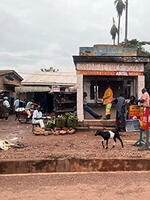
– Combining tax data and Google Street View images
The issue of tax non-compliance among businesses is pervasive in many developing economies, including Uganda. But to what extent do businesses comply with their tax obligations in the capital city, Kampala? Can the local environment and geographic information help predict the risk of tax non...

Parts of Uganda that had centralised political systems before colonial rule are more likely to have higher rates of voluntary tax compliance. Merima Ali and Odd-Helge Fjeldstad look at why that might be the case.Voluntary tax compliance is an important source for domestic revenue in Africa as the...
Working Paper
pdf
– Challenges and prospects for Uganda
This paper simulates the impact of the global minimum corporate tax rate (GMCTR) in Uganda by estimating the difference between the mechanical and the behavioural changes in tax revenue. Overall, implementation of GMCTR will increase tax revenue, and the revenue increase is inversely proportional to...
Working Paper
pdf
– Evidence from Kampala, Uganda
This paper investigates business tax compliance in a multilevel tax structure with limited coordination. We study the case of Kampala, where firms are taxed at national and local levels—by the Uganda Revenue Authority and the Kampala Capital City Authority, respectively—and where the agencies...
Working Paper
pdf
Uganda has one of the lowest corporate income tax collection rates in sub-Saharan Africa, while offering generous corporate tax incentives. It is unclear whether tax incentives achieve their objectives without primarily benefiting firms, potentially undermining domestic revenue mobilization and...
Working Paper
pdf
– A comparative perspective
We examine the distributional effects of the COVID-19 pandemic and associated tax-benefit measures in seven sub-Saharan African countries, focusing on the onset of the crisis.We evaluate impacts on disposable incomes, considering variations across income groups; assess the effectiveness of tax...
Technical Note
pdf
This technical note describes the Uganda Revenue Authority (URA) Pay-As-You-Earn (PAYE) data covering financial years 2013/14 to 2021/22. PAYE is paid by an employer who withholds personal income tax on employees’ wages and other employment incomes like benefits and allowances. The data are...
Working Paper
pdf
– Evidence from Uganda
We investigate how the arrival and expansion of mobile network access in Uganda influences firm tax behaviour. Access to mobile technologies could broaden government revenues from corporate income tax through the extensive margin: by reducing the costs of formalization, it could increase the number...
Journal Article
This peer-reviewed research is available free of charge. UNU-WIDER believes that research is a global public good and supports Open Access.
Part of Journal Special Issue
Fiscal state capacity
Working Paper
pdf
– Evidence from personal income tax reform in Uganda
We evaluate a major personal income tax reform in Uganda that came into effect in 2012–13, contributing to the scarce literature on the effects of personal income tax reform on employees’ income in a low-income country in Africa. The reform increased the tax-free lower threshold, increased tax rates...
Report
pdf
This report documents UGAMOD, the SOUTHMOD model developed for Uganda. It describes the different tax–benefit policies in place, how the microsimulation model picks up these different provisions, and the database on which the model runs. It concludes with a validation of UGAMOD results against...

– A game changer for efficient and fair taxation
In May 2022, the Uganda Revenue Authority (URA) and UNU-WIDER collaboratively launched a secure research data laboratory facility in Kampala, Uganda. The research lab is the second of its kind on the African continent in providing secure access to the revenue authority’s administrative tax data. The...
Working Paper
pdf
We study the effectiveness of social protection benefits in reducing income and consumption poverty in five sub-Saharan African countries—Ghana, Mozambique, Tanzania, Uganda, and Zambia—in normal times and times of widespread economic crisis. Using tax–benefit microsimulation models with...
Working Paper
pdf
Uganda’s post-colony continues to be haunted by the colonial logic of ethnicity. This logic has mapped the country’s post-colonial political landscape as a terrain on which spirals of ethnic-based conflicts and violence are the norm. Because colonial ethnic spatial demarcations were also unequally...
Working Paper
pdf
– Evidence from household panel data in Uganda
Empirical studies on the effectiveness of aid to the water, sanitation, and hygiene sector (WASH aid) have focused primarily on access to these services as the benchmark for evaluating the effectiveness of aid in this sector. Given the importance of WASH services for public health outcomes, the...
Report
pdf
View the latest UGAMOD country report here. This report documents UGAMOD, the SOUTHMOD model developed for Uganda. It describes the different tax–benefit policies in place, how the microsimulation model picks up these different provisions, and the database on which the model runs. It concludes with...
Technical Note
pdf
This technical note describes the Uganda Revenue Authority (URA) firm panel, which is constructed from administrative corporate income tax (CIT) returns and firm registration data for the financial years 2013/14–2019/20. The panel dataset contains over 300 variables, which allow the user to study...
Technical Note
pdf
Agricultural subsidies may have significant productive and distributional consequences, and policy-makers need to be able to assess these impacts as a part of the overall tax and benefit policy. Microsimulation models offer a tool for such analysis also in developing countries, but their coverage...

Millions of Africans lost their jobs as a result of the coronavirus pandemic, but state social security systems were of little help to people who lost their income.This is the conclusion of a study conducted by the United Nations University World Institute for Development Economics Research, UNU...
Working Paper
pdf
We use income data from tax registers at the Uganda Revenue Authority from 2011 to 2017 to estimate top income inequality, focusing on the very top—the top 1, 0.1, and 0.01 per cent of the income distribution. The focus on the extreme top is facilitated by access to population data on formal sector...
Working Paper
pdf
The paper examines the legacy of pre-colonial centralization on tax compliance norms of citizens in contemporary Uganda. By combining geo-referenced anthropological data on pre-colonial ethnic homelands with survey data from several rounds of the Afrobarometer Survey, respondents from the...
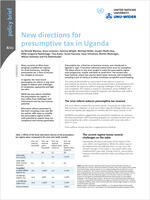
Presumptive tax, a final tax on business income, was introduced in Uganda in 1997. It has been reformed several times since its conception. The latest reform in July 2020 sought to make the presumptive regime more progressive, simpler and fairer to small firms. The revised rates have however raised...
Working Paper
pdf
– Evaluating the 2020 reform and four alternative reform scenarios using UGAMOD, a tax-benefit microsimulation model for Uganda
Presumptive tax, a final tax on business income, was introduced in Uganda in 1997. The latest reform to the regime in July 2020 sought to make the system more progressive, simpler, and fairer to small firms. In this work, we evaluate the reform, focusing on its revenue implications based on...
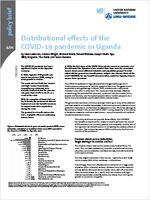
In 2020, the first wave of the COVID-19 pandemic caused an economic crisis that disrupted the Ugandan labour market. How large were the associated income losses across different industries and population groups? To what extent did the general tax-benefit system mitigate the adverse effects of the...

In summer 2020 the SOUTHMOD team set out, with partners, to analyse the impact of government policies on protecting households from getting poorer and avoiding societies from becoming more unequal. Now we are releasing a cross-country comparative study that analyses the distributional effects of the...
Working Paper
pdf
This paper analyses the distributional effects of the COVID-19 pandemic and related tax-benefit measures in 2020 in a cross-country comparative perspective for five African countries: Ghana, Mozambique, Tanzania, Uganda, and Zambia. We first estimate the impact of the crisis on disposable incomes...

– Research recommendations to improve policies
How can we determine the taxation of wage earners or multinational corporations in a fair manner? Will simplifying tax administration help increase tax compliance in a low-income country context? In this blog, we highlight several policy recommendations arising from our collaborative research...

– Does it make a difference?
How could countries in the Global South develop their tax systems further and improve compliance? This analysis shows how two tax administration interventions impacted the number of small business taxpayers and presumptive tax revenues in Uganda. One-stop-shops — where citizens could register for...
Working Paper
pdf
– Do multinational corporations face lower effective tax rates and is there evidence for profit shifting?
We study how large domestic firms and multinational corporations compare in their effective tax rates and whether there is evidence of profit shifting out of Uganda. Using administrative data from the Uganda Revenue Authority and regression analysis, we find that multinational corporations lower...
Working Paper
pdf
– Evidence from Ugandan administrative tax data
This paper conducts an impact evaluation of the effects of two tax administration interventions—a taxpayer register expansion and education programme, and a new electronic filing system for presumptive tax—on the number of small business taxpayers and presumptive tax revenues in Uganda. Using a...
Working Paper
pdf
We evaluate a major personal income tax reform in Uganda that came into effect in 2012–13. The reform increased the tax-free lower threshold, increased tax rates for higher incomes, and introduced an additional highest tax band. Using the universe of pay-as-you-earn administrative data submitted by...
Working Paper
pdf
– Revenue generation, investor-stakeholder alignment, and public policy
This paper discusses the political economy of oil in Uganda since the announcement of its discovery in 2006. It focuses on the dynamics of oil revenue generation (pre-commercial production) and expenditure, investor-stakeholder contestation (i.e. between bureaucrats, investors/oil companies, and...

– Why does more than numbers matter
Can tax research be inspiring? Looking back at the three years of collaboration between UNU-WIDER and the Uganda Revenue Authority (URA), the answer is yes – but even that is just the start. Our joint research and capacity-building programme carrying out analysis of tax administrative data has...
Working Paper
pdf
The distributional analysis of consumption taxes is useful for establishing the welfare impact of tax policy. This paper uses the UGAMOD microsimulation model to establish the tax incidence and welfare impact of excise duty in Uganda. The results reveal that households in the top deciles pay more in...

View the latest UGAMOD country report here. This report documents UGAMOD, the SOUTHMOD model developed for Uganda. The report describes the different tax–benefit policies in place, how the microsimulation model picks up these different provisions, and the database on which the model runs. It...
Working Paper
pdf
– Dead end or steppingstone?
Despite rapid economic growth in recent decades, informality remains a persistent phenomenon in the labour markets of many low- and middle-income countries. A key issue in this regard concerns the extent to which informality itself is a persistent state. Using panel data from Ghana, South Africa...

View the latest UGAMOD country report here. This report documents UGAMOD, the SOUTHMOD model developed for Uganda. This work was carried out by Uganda Revenue Authority (URA) and Makerere University in collaboration with the project partners. The results presented in this report are derived using...
Journal Article
This peer-reviewed research is available free of charge. UNU-WIDER believes that research is a global public good and supports Open Access.
Can agricultural development programs improve health-related outcomes? We exploit a spatial discontinuity in the coverage of a large-scale agricultural extensionprogram in Uganda to causally identify its effects on malaria. We find that eligibility for the program reduced the proportion of household...
Working Paper
pdf
As it transitions to an oil-producing country, Uganda’s investments in infrastructure and physical capital will increasingly depend on the ability of the construction sector to respond to surges in demand and transform investment effort into outcomes. Using administrative and survey data, this paper...
Working Paper
pdf
– How much, when, and how will it be governed?
We study Uganda’s journey to become a petroleum producer and provide estimates regarding the size and timing of the oil revenues to be expected. At an average US$38 per capita per year over a 33-year period, oil revenue by itself will not be transformational for the Ugandan economy, but it could...
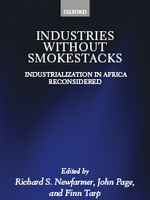
From the book:
Industries without Smokestacks
Working Paper
pdf
This paper analyses policy options to promote local content in Uganda as it transitions into an oil-producing country. It contends that productive linkages between oil and gas exporters and domestic suppliers in a range of ‘connected’ goods and services sectors can be a source of broad-based...
Working Paper
pdf
– The Bayesian perspective
Understanding how internal labour migration affects the agricultural sector is important for all developing countries whose markets do not work well or are non-existent. In fact, even if the movement out of the agricultural sector can be viewed as a process to reach development for many African...
Blog
Several large-scale efforts have been made to combat malaria in the last decade under the Millennium Development Goals, and while these have led to a rapid decline in cases, malaria continues to exact a heavy toll on sub-Saharan Africa, both in terms of human life and economic cost. Given the...
Journal Article
This peer-reviewed research is available free of charge. UNU-WIDER believes that research is a global public good and supports Open Access.
Part of Journal Special Issue
Macroeconomic Perspectives on Aid
Working Paper
pdf
– Evidence from an artefactual field experiment in rural Uganda
We study gender differences in bilateral bargaining using an artefactual field experiment in rural Uganda, through variation in gender composition of bargaining pairs and in disclosure of identities. Disagreement is common independently of disclosure condition, but less frequent among female-only...
Working Paper
pdf
Objective: To analyse factors affecting variations in the observed quality of antenatal and sick-child care in primary-care facilities in seven African countries. Methods: We pooled nationally representative data from service provision assessment surveys of health facilities in Kenya, Malawi...
Working Paper
pdf
– Impacts on investments in education in post-war Uganda
This paper looks at the spillover effects of grants under the Youth Opportunities Programme (YOP) on human capital investments in conflict-affected Northern Uganda. The YOP grant was primarily aimed at providing start-up money to groups of underemployed young people, and in practice worked similarly...
Working Paper
pdf
We use unique high-frequency Government of Uganda and Government of Rwanda tax administration datasets to map the characteristics of ‘industries without smokestacks’ in East Africa. First, we find firm size appears to be crucial for successful industries without smokestacks in services and agro...
Working Paper
pdf
In 2015 the Government of Uganda agreed to start rolling out a social pension programme, and increasing its own contribution to it. This was driven by the highly politicized efforts of a transnational policy coalition, led by international donors and national bureaucrats. It was a struggle over...
Book Chapter
This peer-reviewed research is available free of charge. UNU-WIDER believes that research is a global public good and supports Open Access.
– Explorations using a New Set of Poverty Lines
From the book:
Growth and Poverty in Sub-Saharan Africa
Journal Article
This peer-reviewed research is available free of charge. UNU-WIDER believes that research is a global public good and supports Open Access.
Part of Journal Special Issue
Aid, Education Policy, and Development
Working Paper
pdf
Uganda has seen impressive economic growth and substantial poverty reductions over the past few decades. Today, official headcount poverty stands at about 20 per cent. However, recent research relying on non-monetary wealth indicators challenges official poverty statistics and suggests that...
Working Paper
pdf
– Evidence from an agricultural intervention in Uganda
We exploit a spatial discontinuity in the coverage of an agricultural extension program in Uganda to causally identify its effects on malaria. We find that eligibility for the program reduced the incidence of malaria by 8.8 percentage points, with children and pregnant women experiencing most of...
Working Paper
pdf
The paper proposes an analysis of the recent distributional dynamics in Uganda. This analysis is performed by endorsing an opportunity egalitarian perspective, in order to evaluate the outcome dynamics of specific groups of the population and infer the role of growth in the evolution of inequality...
Working Paper
pdf
The paper investigates the differences in private marginal returns to education between wage-employees and the self-employed in Uganda, using the Mincerian framework with pooled regression models. We use a two-wave household panel to estimate homogenous and heterogeneous private returns to education...

– Economywide Analysis for Ethiopia and Uganda
Rapid urbanization is an important characteristic of African development and yet the structural transformation debate focuses on agriculture’s relative merits without also considering the benefits from urban agglomeration. As a result, African governments are often provided conflicting...
Working Paper
pdf
– Implications for Poverty and its Dynamics in Uganda
Official poverty figures in Uganda are flawed by the fact that the underlying poverty lines are based on a single national food basket that was constructed in the early 1990s. In this paper, we estimate a new set of poverty lines that accounts for the widely divergent diets throughout the country...
Working Paper
pdf
The study examines the relationship between climatic factors and reported malaria cases using data from 12 districts in Uganda over the period 2000-2011. A panel dataset comprising temperature, temperature standard deviation; minimum humidity; maximum humidity; precipitation; precipitation standard...
Working Paper
pdf
– Are there Gender Differences Across Households?
This paper hypothesizes that adaptation to climate change is influenced by the gender of the decision maker of the household. Using a two-wave household panel survey dataset, choice of adaptation strategies employed by female- and male-headed households are examined. A multinomial logit model is...
Journal Article
This peer-reviewed research is available free of charge. UNU-WIDER believes that research is a global public good and supports Open Access.
Part of Journal Special Issue
Urban Governance and Service Delivery in sub-Saharan Africa
Working Paper
pdf
China’s importance as a major donor outside the traditional Western donors has been increasing and this has helped to bridge the funding gaps in developing countries. At the same time, South-South financial assistance still comes with less conditionality making China’s aid model different to Western...
Research Brief
pdf
Favouritism of government controlled councils is most distinct through interference in local politics rather than through funding mechanisms. The motivation of central government intervention in land deals is two-fold - their actions can be explicitly motivated by politics and self-interest or they...
Working Paper
pdf
– Field Evidence from South Africa and Uganda
A new methodology, Tracking Under-Reported Financial Flows (TUFF), allows us to systematically gather open-source information—e.g. news reports, case studies, project inventories from embassy websites, and grant and loan data published by recipient governments—about Chinese development finance...
Working Paper
pdf
The paper looks at the evolution of industry in Uganda examining drivers and constraints since the pre-colonial period in the 1940s to date. It is argued that the state played a central role in industrialization during the pre-colonial and immediate post-colonial period. The paper further looks at...
Research Brief
pdf
Foreign aid is a significant element of Uganda’s long-run fiscal system. Aid is associated with increased tax collection effort and public spending in Uganda. Development assistance is also associated with reduced domestic borrowing in Uganda. Aid is not sufficient to balance Uganda’s budget. Budget...
Working Paper
pdf
– Uganda
This paper seeks to (i) establish the areas in which aid from the major donors is concentrated; (ii) examine how aid has been allocated to the environmental sectors, and (iii) review the factors behind the success of environmental projects. Using data from the Aiddata.org database, the distribution...
Working Paper
pdf
This paper begins by noting that Uganda has been a public sector reform leader in Africa. It has pursued reforms actively and consistently for three decades now, and has produced many laws, processes and structures that are ‘best in class’ in Africa (and beyond). The problem is that many of the...
Working Paper
pdf
A dynamic relationship between foreign aid and domestic fiscal variables in Uganda is analysed using a cointegrated vector autoregressive model over the period 1972-2008. Results show that aid is a significant element of long-run fiscal equilibrium, is associated with increased tax effort and public...
Working Paper
pdf
– a Cointegrated Vector Autoregressive Approach
This paper employs a cointegrated vector autoregressive model to assess the growth effect of aid in Uganda over the period 1972-2008. Results show that aid in Uganda has had both direct and indirect beneficial association with growth; that it is the productivity and not the stead state level of...
Blog
22 August 2013 Roger Williamson Given the high growth rates since 2000 and low labour costs, Africa could develop manufacturing industry, agro-processing, and services. But these cost advantages can easily be undermined by factors such as inadequate infrastructure, particularly power, transportation...
Working Paper
pdf
There has long been an emphasis on the importance of decentralization in providing better quality public services in the developing world. In order to assess the effectiveness of decentralization I examine here the case study of Uganda, which has seen major decentralization of power over the last...
Blog
29 June 2013 Tony Addison The June-July summer issue of Angle comes to you amid the 19 hours daylight of the Finnish mid-summer. Last week UNU-WIDER’s Learning to Compete (L2C) conference on industrial policy and development in Africa was held here in Helsinki. We welcomed 200 researchers and policy...
Working Paper
pdf
– a Hybrid Evaluation Approach Applied to Uganda
Prioritizing public investments requires information on relative returns that are difficult to derive from disparate evaluation studies. This paper presents a ‘hybrid’ approach that combines ex post evaluation data with an economy-wide model for experimenting ex ante with alternative investment...
Working Paper
pdf
Uganda, like other African countries, has implemented reforms to decentralize political authority to local governments and reintroduce multiparty elections. This combination creates opportunities for national partisan struggles to emerge in local arenas and influence local service delivery. This...
Working Paper
pdf
Rapid urbanization is an important characteristic of African development and yet the structural transformation debate focuses on agriculture’s relative merits without also considering the benefits from urban agglomeration. As a result, African governments are often provided conflicting...
Journal Article
– An Analysis of Agricultureversus Urban-led Development in Uganda
Traditional development models focus on the sector rather than location of growth. Advocates of agriculture-led strategies emphasise agriculture's strong growth linkages and potential to raise rural incomes. The new economic geography literature, however, provides theoretical support for urban...
Blog
Tony Addison, Tseday Mekasha, Milla Nyyssölä, Lucy Scott, Finn Tarp, Tuuli Ylinen To meet development objectives, aid recipients and their donor partners need to effectively manage the macroeconomic effects of aid. Aid can improve the economy's supply-side and raise growth. But if the macroeconomic...
Journal Article
Part of Journal Special Issue
African Development in an Urban World
Working Paper
pdf
Urbanization is one of the critical global trends shaping the future of humanity. At the same time, it has been argued that full development requires an urbanized environment. This paper attempts to examine and characterize the major phases of urbanization in Uganda and what this means for urban...
Journal Article
This peer-reviewed research is available free of charge. UNU-WIDER believes that research is a global public good and supports Open Access.
– Policy Lessons from Recent Experience
Part of Journal Special Issue
Development Aid
Working Paper
pdf
– The Case of Uganda
This paper discusses the characteristics and determinants of entrepreneurial behaviour in Uganda. It is based on a recent survey of urban and rural entrepreneurs, executed in May 2008. The main dependent variables are business success, gestation activities and innovative performance. The paper...
Working Paper
pdf
The paucity of non-agricultural paid employment, and under utilization of female labour in Uganda, and other sub-Saharan African countries, is often seen to be the next major obstacle to further poverty reduction and development in the region. Despite this there have been few empirical...
Working Paper
pdf
– Policy Lessons from Recent Experience
This paper investigates the macroeconomic challenges created by a surge in aid inflows. It develops an analytical framework for examining possible policy responses to increased aid, in terms of absorption and spending of aid—where the central bank controls absorption through monetary policy and the...
Journal Article
– Policy Determinants and Measurement
This paper uses data on anthropometric status and reported illness in Uganda to estimate the socio-economic determinants of children's health. After controlling for endogeneity, we find higher household income greatly raises child health. Parental education also improves the health of preschoolers...
Book Chapter
– Micro-Level Investigations in Three African Countries
From the book:
Food Insecurity, Vulnerability and Human Rights Failure
Book Chapter
– The Case of Three ‘Successful’ African Economies
From the book:
Institutional Change and Economic Development
Working Paper
pdf
– Micro-Level Investigations in Three African Countries
HIV/AIDS has a severe impact on food security, affecting all of its dimensions: availability, stability, access, utilization. FAO recognizes that HIV/AIDS is a determining factor for, as well as a consequence of, food insecurity. Although the relationships among gender, food security and rural...
Working Paper
pdf
– A Comparative Analysis of Mauritius, Botswana and Uganda
This paper examines the relationship between institution building and economic performance in Mauritius, Botswana and Uganda. The rationale for comparing these cases is simple. While the three have been super-economic stars in their own right, they have achieved substantially different outcomes...
Book Chapter
From the book:
Understanding Human Well-being
Journal Article
– Looking at Aid Effectiveness from a Different Angle
Part of Journal Special Issue
Aid to Africa

The Millennium Development Goals (MDGs) give aid to Africa a new emphasis. Yet aid flows to Africa have trended downward over the last decade, and as a consequence more Africans now live in poverty. This is especially true of Sub-Saharan Africa. Any progress towards the main MDG target of halving...
Journal Article
Part of Journal Special Issue
Conflict and Peace-building
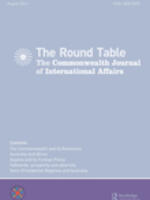
– Interactions between Politics and Economics
Reconstruction from conflict is a complex and demanding task, and a major challenge for the UN system as well as the wider donor community. National authorities and their donor partners are faced with multiple priorities - rebuilding infrastructure, assisting war-damaged communities, and re-creating...
Working Paper
pdf
The long-running conflict in northern Uganda has led to major violations of human rights against civilians, destruction of infrastructure, reduced access to social services, and paralysed economic activity. Creating peace and fostering reconciliation in the region have not been successful either...
Working Paper
pdf
This paper examines trends in income distribution and its linkages to economic growth and poverty reduction in order to understand the prospects for achieving poverty reduction in Africa. We examine the levels and trends in income distribution in some African countries and calculate pro-poor growth...
Book Chapter
– New Microeconomic Tools to Assess Service Delivery
From the book:
Fiscal Policy for Development
Journal Article
– The Case of Uganda in the 1990s
Part of Journal Special Issue
Spatial Issues in Africa

Many developing and transition countries have considerable regional variation in average household income, poverty, and in health and educational status. National human development indicators can therefore mislead policy-makers when large regional disparities exist. This project will investigate the...
Working Paper
pdf
– The Case of Uganda in the 1990s
Absolute poverty lines are often derived from the cost of obtaining sufficient calories. Where staples vary across regions, such poverty lines may differ depending on whether they are set using national or regional food baskets. Regional poverty lines are open to the objection that they may be...
Working Paper
pdf
The paper uses an aid disaggregation approach to examine the impact of different types of aid on the fiscal sector of the aid-recipient country. It uses time-series data on different types of aid (project aid, programme aid, technical assistance and food aid) for Uganda, an important aid recipient...
Book Chapter
From the book:
Reforming Africa's Institutions
Working Paper
pdf
This paper assesses the use of information and communication technologies (ICTs) and their impact on the economic performance of small- and medium-scale enterprises (SMEs) of three East African countries: Kenya, Tanzania and Uganda. Findings of the paper suggest that the diffusion of ICT among East...
Working Paper
pdf
The promotion of human welfare is undoubtedly one of the greatest challenges of economic development. To achieve this, many developing countries adopted trade liberalisation in the late 1980s, premised on the theoretical evidence based on the definitive Heckscher-Ohlin theory which predicts gains...
Working Paper
pdf
After more than a decade of economic decline and civil war, Uganda was able to return to economic growth thanks to the policies pursued by Museveni’s National Resistance Movement which elicited considerable donor support. They include macroeconomic reforms, public sector restructuring, privatisation...
Book Chapter
From the book:
Group Behaviour and Development
Working Paper
pdf
Using panel data from a unique survey of public primary schools in Uganda we assess the degree of leakage of public funds in education. The survey data reveal that on average, during the period 1991–5, schools received only 13 percent of what the central government contributed to the schools’ non...
Working Paper
pdf
– Uganda’s Social Sector Reforms and Outcomes
Uganda is the first country to benefit from the 1996 Heavily Indebted Poor Countries (HIPC) Initiative, which offers a number of low-income countries an opportunity to negotiate a reduction of their external debt, and is utilizing the savings from the relief to implement social sector reforms, via...
Working Paper
pdf
Following close to two decades of political distress and economic decline, Uganda embarked, in the mid 1980s, on far-reaching reforms under Yoweri Museveni’s National Resistance Movement. Decentralization was emphasized, with the new leaders highlighting the importance of proximity to policymakers...
Working Paper
pdf
– Uganda’s Experience
Since the mid-1980s Uganda has had debt strategies, which clearly laid down procedures for negotiating new loans and emphasized commitment to reduce the stock of debt arrears. Over this period, the country went through six Paris Club negotiations and debt reduction operations. Uganda became the...
Book Chapter
– Access to Land and Forest Resources in Uganda
From the book:
Access to Land, Rural Poverty, and Public Action
Blog
by Steve Kayizzi-Mugerwa There is not a single African government that has not attempted public sector reform, including retrenchment, in the past decade. Decentralization is back on the agenda: governments no longer see themselves as sole suppliers of social services, and now frequently opt for...
Journal Article
– The Impact of Financial Liberalization on Access to Rural Credit in Four African Countries
Part of Journal Special Issue
Impact of the Liberalization of the Exchange Rate and Financial Markets in Sub-Saharan Africa
Displaying 128 of 131 results
 Join the network
Join the network


